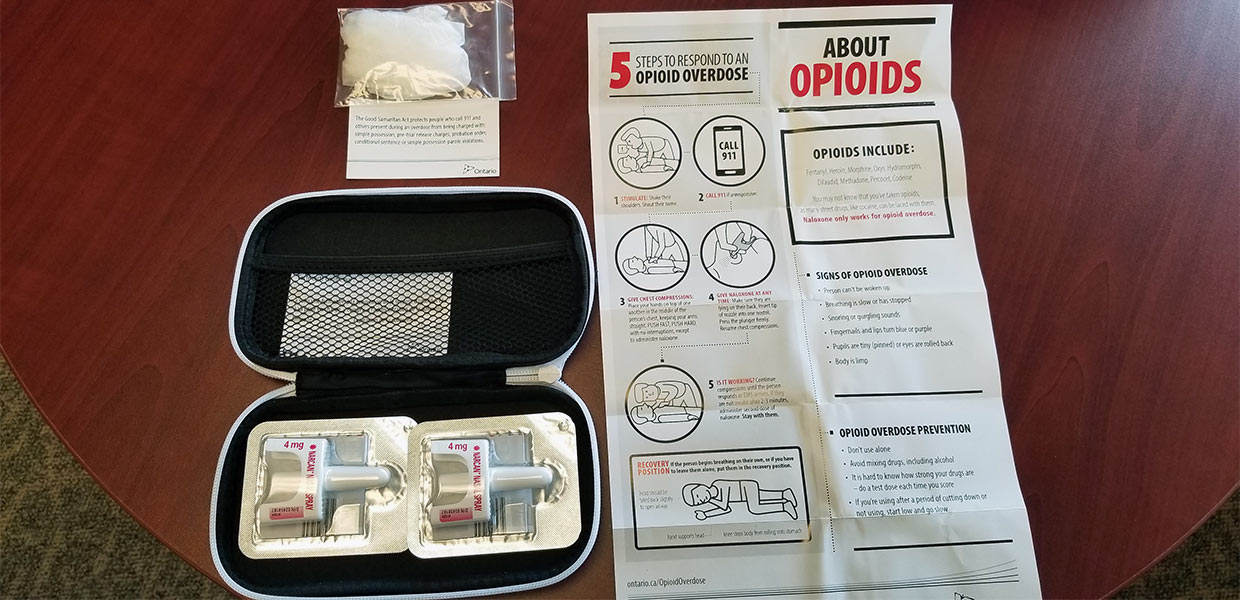Naloxone kit now available for free in NHH Emergency Department
New 24/7 access point in community aimed at reducing harm from opioid overdoses

Naloxone is a drug that helps reduce harm from an opioid overdose. Effective July 2019, Naloxone is now available for free from the Northumberland Hills Hospital (NHH) Emergency Department (ED) to individuals who may engage in the illicit use of opioids.
“We appreciate that there are already a number of access points for Naloxone in Northumberland. These access points include our own Community Mental Health and Addiction program staff, some pharmacies, the Community Health Centre of Northumberland, as well as the Haliburton Kawartha Pine Ridge District Health Unit,” said Susan Walsh, NHH’s Vice President of Patient Services and Chief Nursing Executive. “But opioid overdoses, particularly accidental opioid overdoses, are unfortunately on the rise. If we can help just one individual, then we’re making a difference.”
NHH’s ED is now making the nasal spray Naloxone kits available to patients, together with information on how to administer the drug and education on local resources and supports available to help with addiction recovery. Substance use treatment has many parts, with medication being only one. Mental health support will also be promoted, through NHH resources and other partners in the community. It’s hoped that this new 24-hour-a-day access, seven days a week, will help to improve distribution of Naloxone throughout the community.
Education and training will be provided, both from NHH ED staff, and in the kit itself, to ensure that patients have as much information as possible to make an informed decision regarding Naloxone, and that the appropriate process to administer it is followed.
Each NHH kit contains two doses of Naloxone. Eligibility criteria have also been established to enable hospital staff to distribute more than one kit to high risk individuals, such as those who have had multiple overdoses in recent months, use high potency opioids (Fentanyl, Heroin) or face barriers to accessing refills in a timely manner.
“Unfortunately, those who use illicit drugs are often reluctant to seek help from a health-care provider. Ready access to Naloxone is something that can, frankly, keep someone alive until they’re connected to services and supports that can help to turn their situation around,” said Dr. Peter Barnett, Department Chief in the NHH ED. “We need to do all we can to get Naloxone into the hands of those who need it most—individuals who choose to use illicit opioids, and the family/friends who care about them. In cases of an overdose, timing is everything, so the easier the access, the better.”
When should Naloxone be administered?
If an individual is showing signs of an opioid overdose (these include, but are not limited to: blue lips or nails; extreme drowsiness; choking or gurgling sounds; slow, weak or no breathing; and, an inability to wake up, even when shaken or shouted at), Naloxone should be administered right away, in needle form or—as now available at the NHH ED—as an easy-to-use nasal spray. By temporarily reversing the effects of many opioids, Naloxone helps the individual breathe normally and regain consciousness. The need for emergency medical attention remains, but Naloxone can provide precious minutes to call 911, access that care and, hopefully, save a life.
What is the Good Samaritan Drug Overdose Act?
The Good Samaritan Drug Overdose Act became law in Canada on May 4, 2017 and provides some legal protection for individuals who seek emergency help during an overdose, as well as those at the scene when help arrives. The Act is aimed at helping to reduce fear of police attending overdose events by focusing attention on harm reduction. In all cases of suspected overdoses, staying at the scene is important to help save the life of the person experiencing the overdose and to relay potentially critical information to emergency personnel.
Related information
For more information on local access points for free Naloxone kits, please click here.
For information on Canada’s Good Samaritan Drug Overdose Act, click here.
For information on mental health and addiction supports available from NHH, including the Walk-In Counselling Clinic for Youth, Children and Adults (aged 7 and up), click here.
